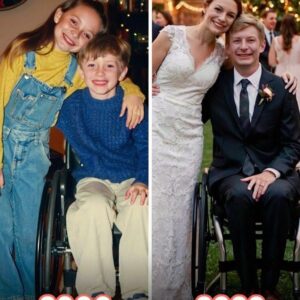In the heart of a city alive with movement, where car horns played in rhythm with hurried footsteps and vendors called from busy corners, Officer Tom Grady moved with calm purpose through it all.
A veteran of the force, Grady wasn’t known for cracking down or raising his voice—he was respected for his steady presence, his quiet authority, and most of all, his belief that listening could solve more than shouting ever could.
To the people of the neighborhood, he was more than just a badge. He was a familiar face, someone who knew which deli made the best sandwiches, who gave directions with a smile, and who treated every person—no matter their background or troubles—with decency.
He didn’t see his job as simply enforcing rules. To him, being a policeman meant being part of the community fabric: a guide, a guardian, and when needed, a calming presence.
One cloudy afternoon, Grady was called to the city park—a favorite gathering spot where families picnicked, kids raced their scooters, and performers filled the air with music and laughter. But today, things were different. A crowd had formed around two entertainers, and their argument had grown loud enough to drown out even the nearby fountain.
A red-haired juggler, his pins scattered at his feet, stood nose to nose with a mime in white face paint and suspenders, who was gesturing angrily without making a sound. Bystanders looked on with a mix of curiosity and concern.
Grady arrived and calmly stepped into the circle. “Alright,” he said, holding up his hands, “let’s all take a breath. I’m Officer Grady. Let’s figure this out like neighbors.”
The juggler pointed an accusing finger. “He’s been stealing my spot! I’ve been performing here every Thursday for three years!”
The mime began gesturing dramatically again, acting out what seemed to be a calendar, then pointed to himself. It was oddly impressive—infuriating, but impressive.
Grady listened, nodding, letting each man speak—or, in the mime’s case, perform—his side of the story. There was no yelling from Grady, no threats. Just calm questions and steady eye contact. Slowly, the tension began to unravel. The juggler admitted he hadn’t actually reserved the space. The mime, in turn, offered to shift his routine fifteen feet to the right.
Eventually, laughter bubbled up from the crowd. Someone clapped. Even the juggler chuckled and gave the mime a mock bow, which the mime returned with a theatrical tip of an invisible hat.
Grady smiled, gave both performers a nod, and turned to the crowd. “Alright, folks, show’s over—but feel free to stick around for the next one.”
As the onlookers dispersed and the park settled back into its usual rhythm, Grady continued his patrol. Just another day, another moment defused not by force, but by patience and presence. That was how Officer Tom Grady worked—one peaceful resolution at a time, reminding his city that sometimes, the strongest kind of authority is the kind that listens first.





